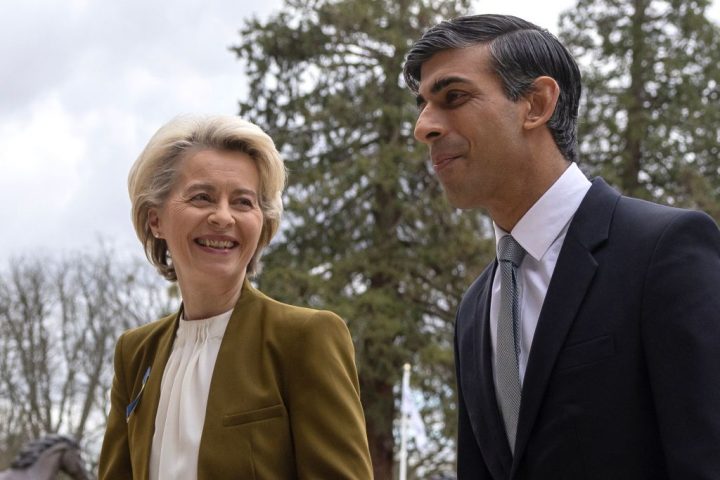White smoke has emerged from Windsor. Now that a deal between the UK and EU over Northern Ireland has emerged, can the DUP endorse it?
Early reports that the party were on board – and were planning on using a dinner in London this evening to begin rationalising this to their supporters – were dismissed by the DUP leader Jeffrey Donaldson as ‘entirely fictional’. He reiterated the line that he and his party needed time to chew it over.
The DUP themselves have said in their own response to today’s developments that there has been progress. The fact they have not gone for an outright no will please Downing Street and the Northern Ireland Office greatly.
While much of the focus in Westminster has been on the likes of Steve Baker describing it as a ‘win’ and the implications for the process of steering this deal through parliament, another man stood up to give his view on the Windsor Framework – and that voice will arguably carry more weight with the DUP.
Jim Allister, leader of the Traditional Unionist Voice, took to the great hall in Stormont and said, that on the basis of what he has seen so far, he would expect the DUP to reject the deal. On first flush, the deal was not enough to prevent ongoing fundamental divergence between Northern Ireland and the rest of the UK.
That is why the DUP’s response did contain overt references about the need to study the document and also said serious issues remain with it, notably the role of the ECJ. Therefore, whether the deal can fly with people like Allister – and how the DUP can sell it to him and their wary electorate – is fundamentally key to its longevity beyond any machinations in Westminster.
The DUP have arrived at a moment of maximum danger. Should they decide on balance to back an imperfect deal – and based on initial impressions, there remain imperfections such as how meaningful the ‘Stormont Brake’ is for example – they leave themselves open to attacks from the likes of Allister on the Unionist right.
History tells us that unionist parties which act as reluctant salespeople for a deal rarely fare well. Jeffrey Donaldson’s political career was forged when he disagreed with the late David Trimble over the substance of the Belfast Agreement. As the UUP tore itself apart irreparably over that deal, Donaldson departed for the DUP. He more than most is aware of what can happen to the dominant unionist party when it has to push forward something which is more constitutionally nuanced than maximalist: this will be a real test of DUP unity.
Beyond the confines of the DUP, what will the more excitable elements of the unionist and loyalist political firmament do? Jamie Bryson, a firebrand unionist activist who has appeared with Donaldson and Allister at anti-Protocol rallies across Northern Ireland, has said the success of any deal should be measured in two ways: ‘Is the act of Union restored? Is our subjugation over?’.
As a result of the tone of the unionist campaign against the Protocol, many in the grassroots will be hardened against anything which comes with even the slightest whiff of backsliding. At the weekend, it was reported in the Northern Irish press that sources in the Ulster Volunteer Force have threatened to ‘wreck the place’ should the deal fail to meet their criteria, though the security forces will query how feasible that is.
With all of that to play for, don’t expect any rapid movement from the DUP on this. That will predictably cause disquiet at Westminster and amongst those in Downing Street who want the Prime Minister to have his own ‘I can feel the hand of history on my shoulder’ moment. While the negotiators will feel they have alighted upon something which answers the procedural challenges posed by the Protocol, it will be for unionists to decide whether it deals with more existential matters.






Comments